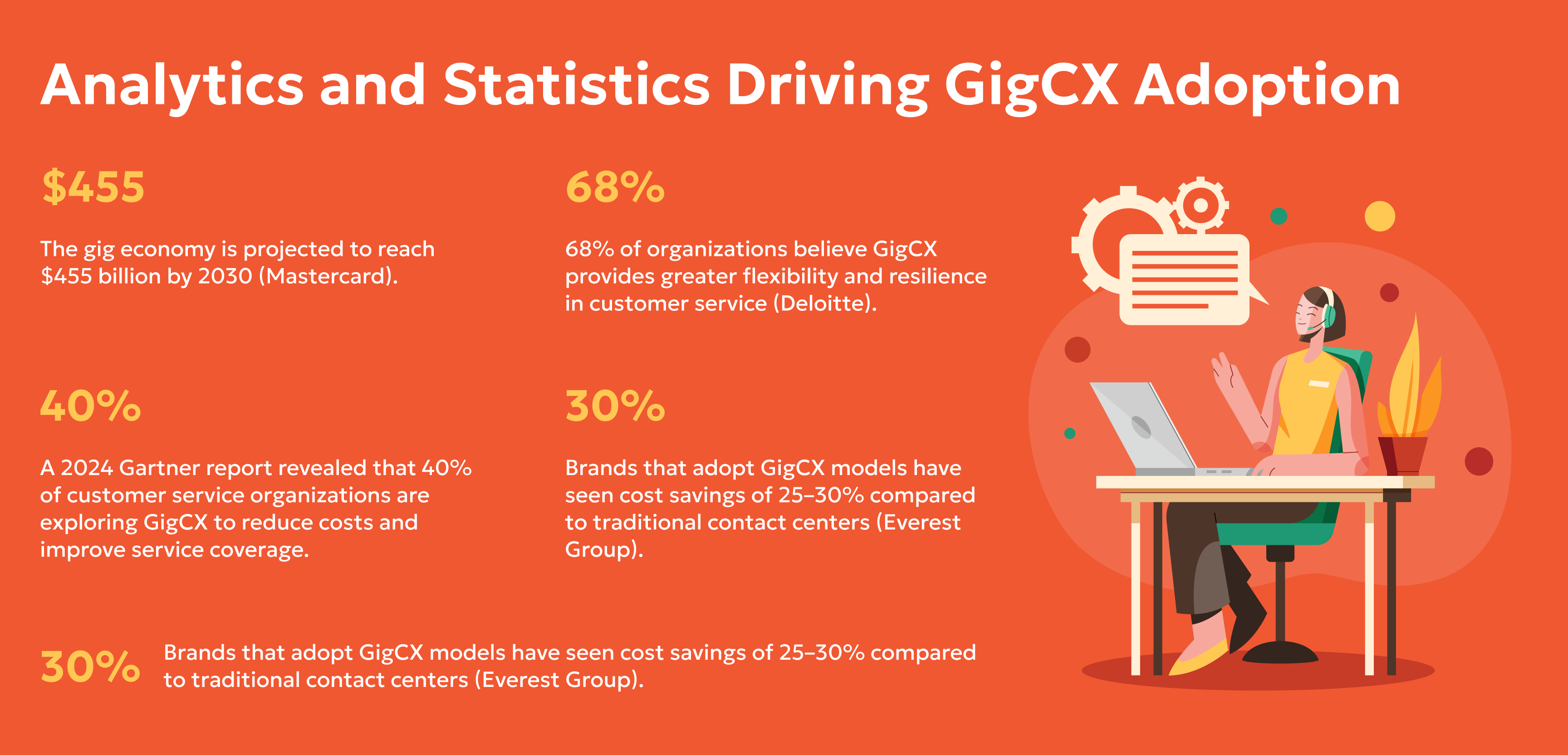The way companies manage customer service is rapidly evolving. Traditional contact centers with fixed schedules and full-time staff are no longer the only model. Instead, a new approach is emerging: GigCX, or “Gig Customer Experience.” This model taps into the global gig economy, allowing businesses to access flexible, on-demand customer service talent who can scale with fluctuating demand.
For companies seeking agility, scalability, and cost-efficiency, GigCX is becoming a game-changer.
What Is GigCX?
GigCX refers to the outsourcing of customer support tasks to freelance or on-demand workers, often using cloud-based platforms. Unlike traditional agents who work 9-to-5, GigCX agents log in when they are available, handling customer interactions during peak times, seasonal surges, or unexpected demand spikes.
This model is gaining traction across industries such as e-commerce, travel, fintech, and SaaS — where customer queries are highly variable and require rapid scaling.


Analytics and Statistics Driving GigCX Adoption
The gig economy is projected to reach $455 billion by 2030 (Mastercard).
68% of organizations believe GigCX provides greater flexibility and resilience in customer service (Deloitte).
A 2024 Gartner report revealed that 40% of customer service organizations are exploring GigCX to reduce costs and improve service coverage.
Brands that adopt GigCX models have seen cost savings of 25–30% compared to traditional contact centers (Everest Group).
Surveys show that 70% of customers expect faster service during peak periods, which GigCX helps deliver (PwC).
These analytics highlight how GigCX is not just a cost-saver, but also a strategic enabler of better customer experience.
Key Benefits of GigCX

Scalability on Demand
Companies can ramp up service during high-demand seasons (e.g., holidays, product launches) without the burden of permanent overhead.

Access to Specialized Talent
GigCX attracts skilled professionals, including bilingual speakers, subject-matter experts, and even brand advocates who deliver authentic customer interactions.

Improved Customer Experience
With 24/7 coverage across global time zones, customers receive faster resolutions and more personalized service.

Cost Efficiency
By shifting from fixed labor costs to flexible, task-based spending, businesses reduce operational expenses while maintaining high-quality support.

Employee Satisfaction and Flexibility
GigCX agents value autonomy, flexible schedules, and the opportunity to choose brands they are passionate about — leading to more motivated and engaged interactions.
How XMCBPO Supports the GigCX Revolution
At XMCBPO, we recognize that the future of customer service lies in adaptability. Our GigCX solutions empower businesses to seamlessly integrate on-demand talent into their support operations. By combining AI-driven workforce management, real-time analytics, and a network of skilled gig professionals, we help brands achieve scalability without compromising quality.
Whether it’s handling peak-season demand, multilingual support, or specialized queries, XMCBPO ensures that companies stay agile and competitive in today’s customer-first world.
Conclusion
The rise of GigCX marks a major shift in how businesses approach customer service. As the gig economy expands, organizations can no longer rely solely on traditional staffing models. By embracing on-demand, flexible customer support, brands can deliver faster, more personalized experiences while maintaining efficiency and reducing costs.
With partners like XMCBPO, companies can confidently transition into this new era of customer service — where agility, scalability, and emotional connection define the customer experience of the future.
References
- Davies Group. The 2020 Gig Customer Service Report
- Business Wire. Limitless: 83% of Customer Service Managers Have Added, or Plan to Add, GigCX Talent in the Next Two Years
- Customer Think. GigCX Levels Up: 5 Key Takeaways from the 2023 GigCX Report
- Deloitte. The gig economy and future of shared services and GBS delivery models
- Intelligent Sourcing. Is GigCX Changing The Future Of Work Itself?



